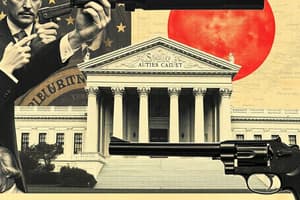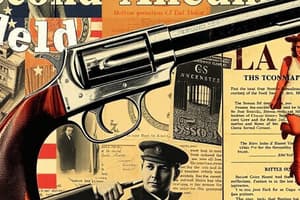Podcast
Questions and Answers
In District of Columbia v. Heller, what was the primary argument made by Dick Heller against the District of Columbia?
In District of Columbia v. Heller, what was the primary argument made by Dick Heller against the District of Columbia?
- The city's gun control laws infringed on his First Amendment rights to free speech.
- The city unfairly denied him employment as a police officer due to his stance on gun control.
- The city's gun buyback program was a violation of due process under the Fifth Amendment.
- The city's regulations violated the Second Amendment by restricting his right to possess a handgun in his home. (correct)
The Supreme Court's ruling in District of Columbia v. Heller stated that the Second Amendment provides an individual right to keep and bear arms for any purpose, with no limitations.
The Supreme Court's ruling in District of Columbia v. Heller stated that the Second Amendment provides an individual right to keep and bear arms for any purpose, with no limitations.
False (B)
According to the Supreme Court's decision in District of Columbia v. Heller, what is one example of a safety-related restriction that states may impose on handgun ownership?
According to the Supreme Court's decision in District of Columbia v. Heller, what is one example of a safety-related restriction that states may impose on handgun ownership?
prohibiting felons from handgun ownership
The District of Columbia v. Heller case centered around a Washington, D.C., statute that prohibited possessing a handgun in the home without a ______.
The District of Columbia v. Heller case centered around a Washington, D.C., statute that prohibited possessing a handgun in the home without a ______.
Match the following elements from District of Columbia v. Heller with their correct description:
Match the following elements from District of Columbia v. Heller with their correct description:
Flashcards
District of Columbia v. Heller
District of Columbia v. Heller
A landmark Supreme Court case affirming individual gun rights under the Second Amendment.
Second Amendment
Second Amendment
Part of the U.S. Constitution protecting the right to keep and bear arms.
Individual right to bear arms
Individual right to bear arms
The ruling states the Second Amendment ensures personal gun ownership without military ties.
Safety regulations
Safety regulations
Signup and view all the flashcards
Unconstitutional laws
Unconstitutional laws
Signup and view all the flashcards
Study Notes
District of Columbia v. Heller (2008)
-
Rule of Law: The Second Amendment guarantees an individual right to keep and bear arms for purposes such as self-defense, apart from military service. This right is subject to reasonable regulations.
-
Facts: Dick Heller, a Washington, D.C. police officer, applied for a handgun registration but was denied under a D.C. law prohibiting handguns in the home, unless rendered inoperable. His lawsuit challenged the legality of this law.
-
Issue: Does a law prohibiting the possession of usable handguns in the home violate the Second Amendment?
-
Holding and Reasoning: The Court held that the D.C. law was unconstitutional. The majority opinion reasoned that the Second Amendment protects an individual's right to possess firearms independent of service in a militia, and this right applies to the home. The Second Amendment is not limited to weapons used by militias, and self-defense is a lawful purpose of firearm possession.
-
Dissent (Stevens): The majority's decision misunderstands the scope of the Second Amendment, arguing it is only related to the use of firearms in service of a militia.
-
Dissent (Breyer): The D.C. law is reasonable and does not violate the Second Amendment, as it addresses a specific public safety concern regarding handguns in high-crime urban areas.
Second Amendment Debate
-
Text and Original Meaning: The text of the Second Amendment ("the right of the people to keep and bear arms") is the key subject of debate, with differing views on whether it safeguards an individual right or a collective right (related to maintaining a militia). Scholars and judges debate what the phrase "the people" refers to in this specific context and historical interpretations. Original meanings provide the framework for a better understanding of the document.
-
Individual vs. Collective Right: The dispute centers on whether the Second Amendment protects an individual right to bear arms for self-defense or a collective right limited to maintaining a well-regulated militia.
-
Historical Context: The 18th-century understanding of the right to bear arms for self-defense and the militia is being weighed against this modern issue. The Court considers this historical context to clarify the meaning of the Second Amendment.
-
Limitations: Even if the Second Amendment protects an individual right to bear arms, there are reasonable restrictions (e.g., prohibitions for felons or those with mental health issues, regulations on carrying firearms in specific locations etc.)
Implications of the Ruling
- Regulation: The Court's decision in Heller opened up a debate on what types of gun regulation are acceptable.
- Future Cases: This decision had a significant impact on future Second Amendment cases, establishing the scope of the individual right to bear arms and potentially limiting certain gun control measures.
Studying That Suits You
Use AI to generate personalized quizzes and flashcards to suit your learning preferences.




